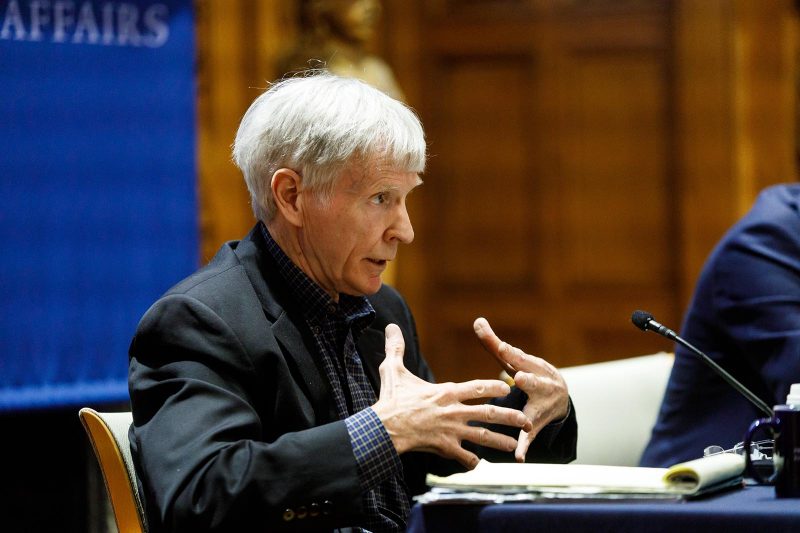Retired U.S. Ambassador Ryan Crocker visited campus Nov. 30.
On November 30, International Security Studies hosted the Discussion Forum, “Assessing U.S. Diplomacy Two Decades After 9/11,” featuring one of America’s most distinguished former diplomats, Ambassador Ryan Crocker. A former Jackson Senior Fellow, Crocker served as U.S. ambassador to Afghanistan, Iraq, Pakistan, Syria, Kuwait, and Lebanon.
Ted Wittenstein, executive director of ISS, moderated the conversation, which was held in Horchow Hall and simulcast via Zoom.
Crocker kicked off the discussion by reflecting on his experiences in the Middle East and evaluating American foreign policy in the region— focusing on the immediate aftermath of the September 11 attacks.
“After 9/11, everything changed and our leadership saw this was an opportunity to start talking to the Iranians about Afghanistan knowing as we did, of course, that the two countries had almost gone to war just a few years before,” said Crocker, who was sent to Kabul in early 2002 to re-open the U.S. embassy.
Crocker says he quickly realized that “post-9/11, diplomacy and the military were going to be joined. This was not World War II, it wasn’t Vietnam, it wasn’t Korea.”
“This was a whole new paradigm of military involvement in a very complex political situation with multitudes of actors and varying agendas and that we would have to find a way to be sure we were sharing assessments and coordinating efforts. And I do believe 20 years on that continues to be the world we are still in,” Crocker said.
Crocker also addressed the complex relationship between the U.S. and Pakistan, where he was posted for three years and developed close ties, particularly in the aftermath of the deadly Kashmir earthquake.
“The U.S. led a very successful relief effort, spearheaded by the U.S. military. It reinforced my belief that the United States military is among other things the most powerful humanitarian organization on earth,” Crocker said.
The relationship soured when the U.S. began to re-impose sanctions on Pakistan for its nuclear weapons program, following a successful joint effort to expel the Soviets from Afghanistan, Crocker explained.
The conversation then shifted to more recent events in Afghanistan, namely the U.S. withdrawal and the Taliban takeover of the country. Crocker emphasized that the notion that Afghan security forces were not ready to fight and die for their country was undervaluing the sacrifices they have made.
“The aftermath we’re now dealing with, that the world is now dealing with, is going to require a huge investment in diplomatic effort,” Crocker said.
Following the discussion, Crocker took audience questions on a variety of topics, including China as a growing power; balancing interests in cooperating with India and Pakistan; the way forward in Iraq and Afghanistan; and the need for American strategic patience.
